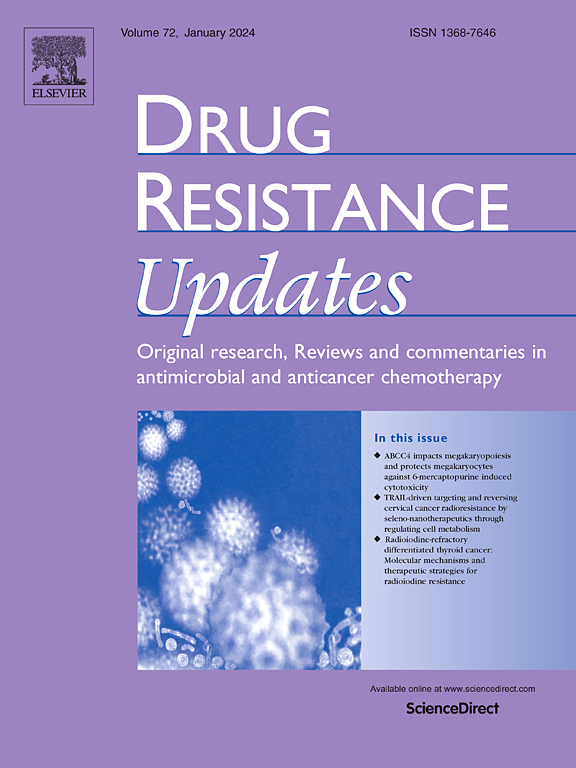Engineering nanoplatforms of bacterial outer membrane vesicles to overcome cancer therapy resistance
IF 21.7
1区 医学
Q1 PHARMACOLOGY & PHARMACY
引用次数: 0
Abstract
Resistance to cancer therapy is driven by physical barriers, tumor heterogeneity, selective therapeutic pressure, immunosuppressive tumor microenvironment (TME) and others. Bacterial outer membrane vesicles (OMVs) represent a promising nanotherapeutic platform to combat cancer therapy resistance. This review discusses the dual roles of OMVs in tumorigenesis and cancer therapy, highlighting their potential applications to enhance treatment efficacy. OMVs from pathogenic bacteria, such as Fusobacterium nucleatum and Helicobacter pylori, exacerbate chemoresistance by reshaping TME through hypoxia-induced metabolic reprogramming and immune evasion, while OMVs from some bacteria, such as probiotics, counteract immunosuppression by promoting cytotoxic T-cell infiltration and macrophage polarization. As bio-derived and conveniently engineered drug delivery platforms, OMVs maximize the synergetic anticancer effect by pathogen associated molecular patterns and the payloads. These functional payloads include siRNAs, cytotoxicity and molecular agents, and immune checkpoint inhibitors. Bacterial OMVs demonstrate unique advantages through their capacity to penetrate physical barriers, achieve tumor-specific targeting, activate immune responses, to overcome cancer therapy resistance. A successful example is the OMV-based nanoplatform with engineered OMVs co-delivering CD47-siRNA and doxorubicin to overcome drug resistance by inducing immunogenic cell death and dendritic cell activation of glioblastoma. Furthermore, OMV-based cancer vaccines presented with tumor antigens or hybridized with tumor-derived membranes enhance dendritic cell maturation and antigen-specific T-cell responses, reversing treatment resistance. By addressing challenges in mass production and safety concerns, OMVs-based platforms can be developed as powerful tools for more effective and personalized cancer treatments.
细菌外膜囊泡的工程纳米平台克服癌症治疗耐药性
对癌症治疗的耐药性是由物理障碍、肿瘤异质性、选择性治疗压力、免疫抑制肿瘤微环境(TME)等因素驱动的。细菌外膜囊泡(OMVs)代表了一个有前途的纳米治疗平台,以对抗癌症治疗耐药性。本文综述了omv在肿瘤发生和癌症治疗中的双重作用,重点介绍了它们在提高治疗疗效方面的潜在应用。来自致病菌(如核梭杆菌和幽门螺杆菌)的omv通过缺氧诱导的代谢重编程和免疫逃避来重塑TME,从而加剧化疗耐药,而来自某些细菌(如益生菌)的omv则通过促进细胞毒性t细胞浸润和巨噬细胞极化来抵消免疫抑制。作为一种生物衍生的、方便工程的药物传递平台,omv通过病原体相关的分子模式和有效载荷最大限度地发挥协同抗癌作用。这些功能性有效载荷包括sirna、细胞毒性和分子制剂以及免疫检查点抑制剂。细菌omv通过其穿透物理屏障,实现肿瘤特异性靶向,激活免疫反应,克服癌症治疗耐药性的能力显示出独特的优势。一个成功的例子是基于omv的纳米平台,其中工程omv共同递送CD47-siRNA和阿霉素,通过诱导胶质母细胞瘤的免疫原性细胞死亡和树突状细胞活化来克服耐药性。此外,基于omv的癌症疫苗与肿瘤抗原一起呈递或与肿瘤源性膜杂交,可增强树突状细胞成熟和抗原特异性t细胞反应,逆转治疗耐药性。通过解决大规模生产和安全问题的挑战,基于omvs的平台可以发展成为更有效和个性化癌症治疗的强大工具。
本文章由计算机程序翻译,如有差异,请以英文原文为准。
求助全文
约1分钟内获得全文
求助全文
来源期刊

Drug Resistance Updates
医学-药学
CiteScore
26.20
自引率
11.90%
发文量
32
审稿时长
29 days
期刊介绍:
Drug Resistance Updates serves as a platform for publishing original research, commentary, and expert reviews on significant advancements in drug resistance related to infectious diseases and cancer. It encompasses diverse disciplines such as molecular biology, biochemistry, cell biology, pharmacology, microbiology, preclinical therapeutics, oncology, and clinical medicine. The journal addresses both basic research and clinical aspects of drug resistance, providing insights into novel drugs and strategies to overcome resistance. Original research articles are welcomed, and review articles are authored by leaders in the field by invitation.
Articles are written by leaders in the field, in response to an invitation from the Editors, and are peer-reviewed prior to publication. Articles are clear, readable, and up-to-date, suitable for a multidisciplinary readership and include schematic diagrams and other illustrations conveying the major points of the article. The goal is to highlight recent areas of growth and put them in perspective.
*Expert reviews in clinical and basic drug resistance research in oncology and infectious disease
*Describes emerging technologies and therapies, particularly those that overcome drug resistance
*Emphasises common themes in microbial and cancer research
 求助内容:
求助内容: 应助结果提醒方式:
应助结果提醒方式:


